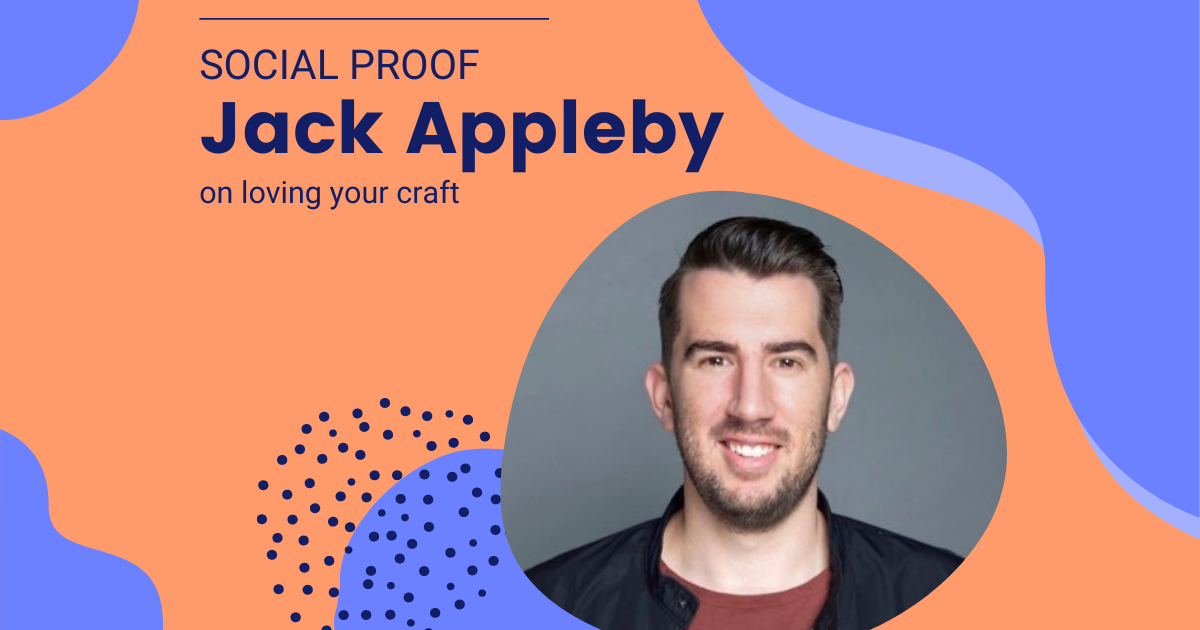
Social Proof: Jack Appleby on Loving your Craft
In this interview, we talk with Jack Appleby about loving your craft, career-proofing yourself, and dealing with negativity on social media.

Content Writer @ Buffer
This edition of Social Proof features Jack Appleby, our first creator with a presence outside of Twitter. Jack is a social strategist with an impressive resume spanning over ten years. He’s run campaigns for Beats By Dre, Microsoft, and Spotify and was on the Creative Strategy team at Twitch. He now works at Morning Brew as a Creator writing Future Social, a newsletter about social media strategy.
Jack built his Twitter following through in-depth social media analysis threads, which got him the attention of his favorite NBA teams and dream companies, as well as provided him opportunities when he needed them the most. In this interview, we talk about loving your craft, career-proofing yourself, and dealing with negativity on social media.
Q: It’s great to have you in for Social Proof, Jack! What do you think about personal branding in general? Would you even call it a personal brand?
When I started building my social media presence, it wasn't with the idea of a personal brand - I just knew I was living in a small pond. I realized I'd been at one company for five years and hadn’t made enough connections in my industry, and I wanted to learn from other people. Twitter seemed like the best way to meet some new pals.
So I started tweeting my thoughts on advertising and social media, hoping to find new peers and mentors. It was a modest number for years - 5,000, maybe 10,000 followers. Then I started tweeting analysis threads, and suddenly it blew up. In one year, I went from 10,000 followers to 30,000, hitting more than 50,000 now. Once I realized I developed an audience, I sort of had to treat it like a personal brand! And now it’s part of my job! My social media accounts combine with my newsletter, Future Social, to form one big ecosystem at Morning Brew.
Alrighty. So I've got this new job!
— Jack Appleby ☕️ (@jappleby) April 4, 2022
After 10 years working Social Media for brands like Beats By Dre, Twitch, Microsoft, Verizon, DC Comics, Community + more, I've joined @MorningBrew as a Creator.
Let's talk about what that actually means. 🧵:
But personal brands are one of the most incredible ways to career-proof yourself. I've gotten my last three jobs from Twitter DMs - that’s where the conversation started.
Q: That’s interesting – the initial lack of intention to build a personal brand. There seems to be a common theme among the people we’ve interviewed for this series: either starting with what interests you or focusing on finding community before growing a following. How do you decide which platforms to focus on?
It’s all about your priorities. If you want to build a personal brand, it's natural to go to Twitter. But if you're doing it to get job opportunities and show your expertise, it's probably more valuable to build on LinkedIn, which gets incredible engagement and functionally ties your content directly to your resume.
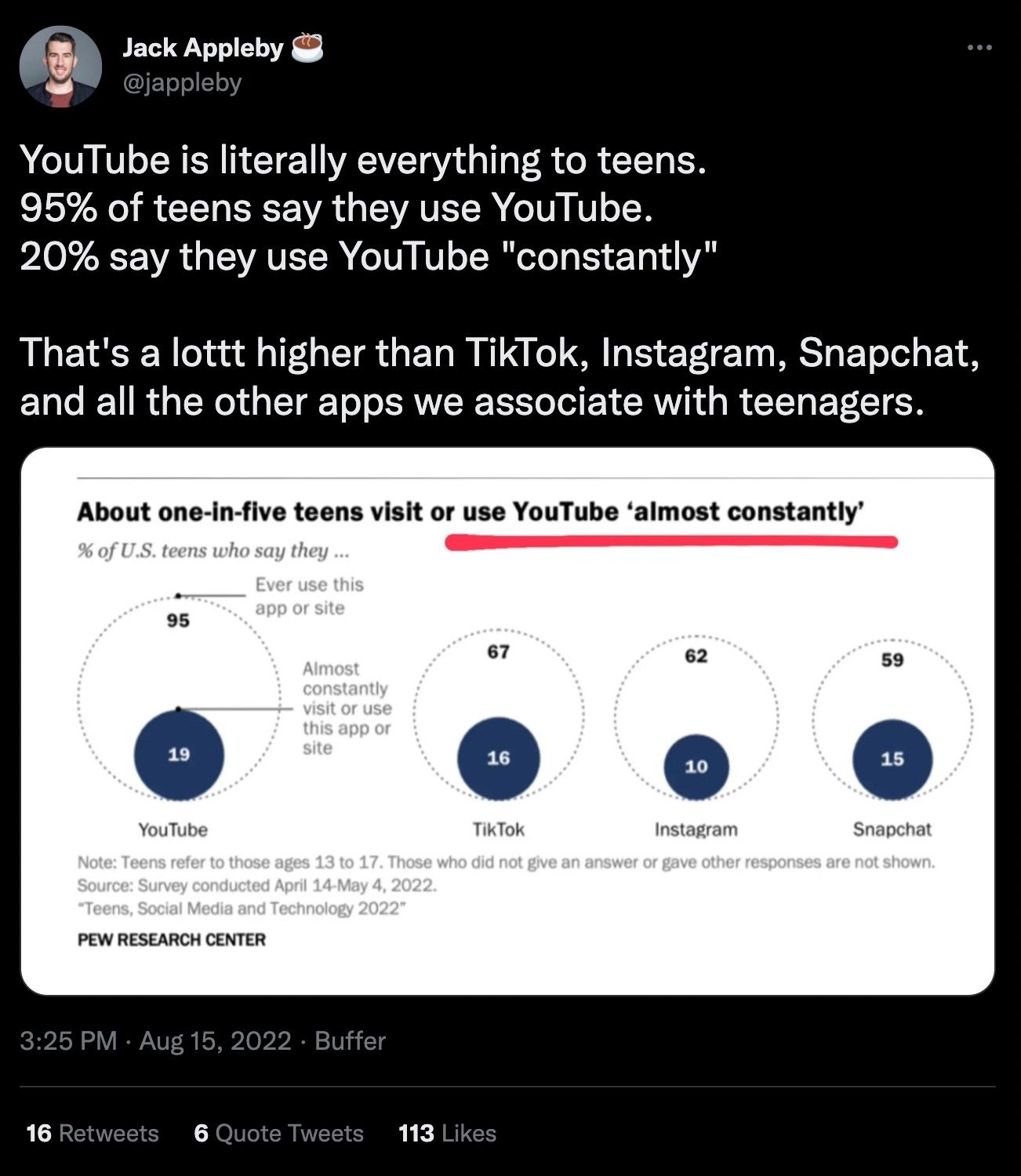
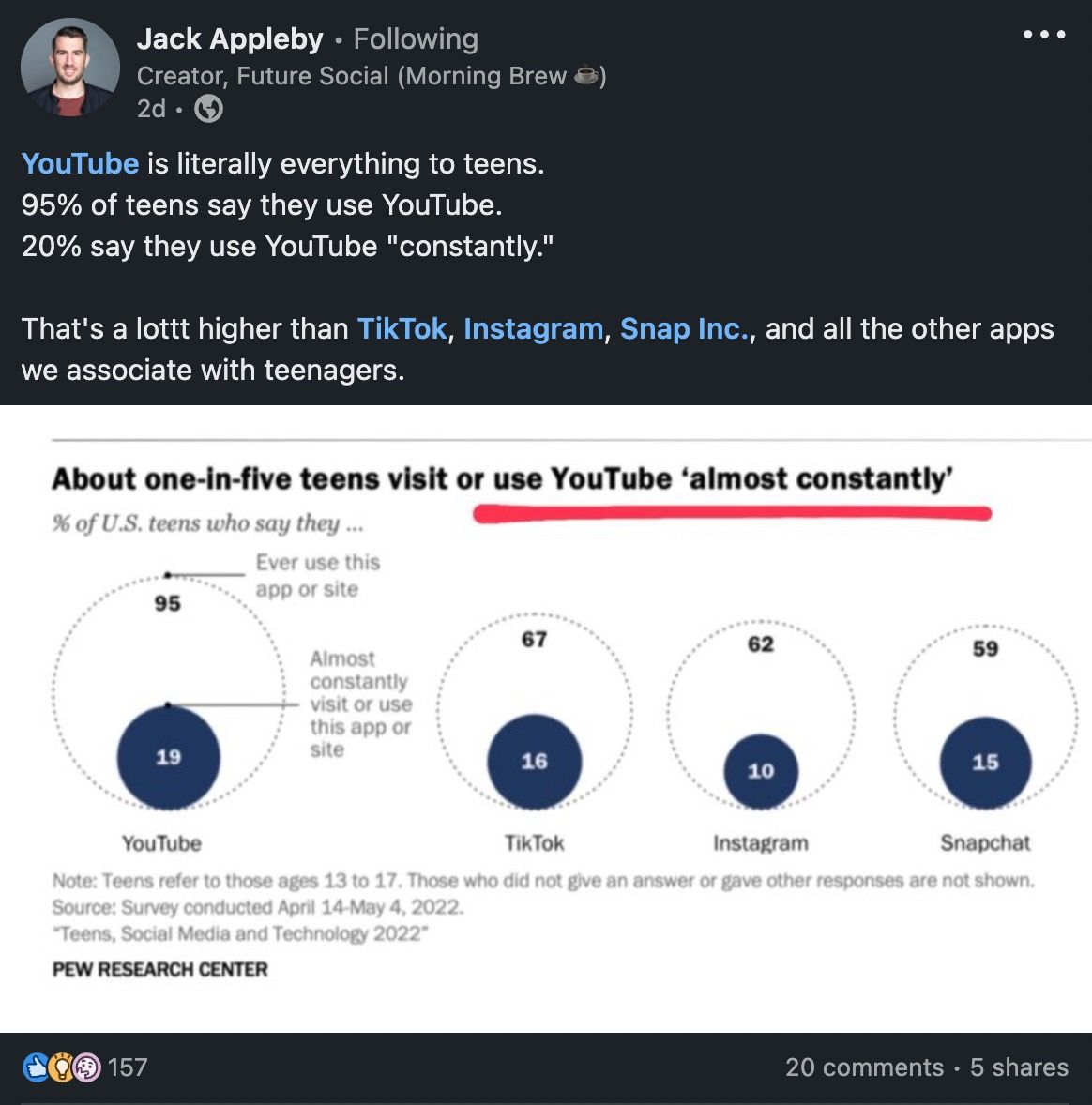
A friend named Brittany Krystle used to work with GaryVee - now she's a LinkedIn specialist. She encouraged me to repurpose my tweets for LinkedIn – an effortless copy-paste strategy. Literally just tossing my tweets on LinkedIn. So I took her advice and drew an audience of 11,000 followers, all off a minimum-effort posting strategy.
Q: Which do you prefer – Twitter or LinkedIn?
I’ve recently shifted more towards LinkedIn than Twitter. For one, it feels less toxic – you're far less likely to run into extreme negativity on LinkedIn than you are on Twitter. The bird app also has a high chance of anonymous accounts where people aren’t representing themselves, using avatars or some other version of anonymity. On LinkedIn, almost everybody is showing up as who they really are.
On the other hand, LinkedIn gets a bad rep for being very corny and a very white platform, which I think are both incredibly fair criticisms. That said, I’ve found people on LinkedIn come off much more willing to learn and interested in growth conversations than those on Twitter. But that’s anecdotal – everyone's got a different experience!
Q: Can you define your personal brand in three words/phrases/ terms?
Three words might be tough – I can do phrases? One: I want to help people understand social strategy. That is the number one thesis of everything I'm doing now.
And two, I want to be the Julia Child of social media. That second one’s a bit of a joke answer but still rings true for me – I think social media can be broken down enough that anyone can learn in space.
Q: Can you paint a picture of your actions that directly resulted in opportunities?
I started by focusing on writing social media analysis - figured that’d be a good way to show how my brain works. I’d frequently write Twitter threads as case studies to highlight brands doing incredible work in the [social strategy] space.
Eventually, people followed me and reached out - I was building a reputation as a thinker. The reality at the time: there weren’t a ton of people tweeting deep social media strategy! I was able to build a reputation as one of the handful who writes in-depth analysis alongside thought pieces on the future of social. It became a great way for me to find new jobs!
Big news: I'm free for hire
— Jack Appleby ☕️ (@jappleby) June 30, 2020
thanks to COVID.
Very excited to get back to my loves - social, creative strategy, & content.
Give me a shout,
let's make something cool.https://t.co/yAFRSzfRoc
I was laid off from a job due to COVID in mid-2020, and for the first time in my life, I did not have a job – I had never been in that situation ever! So I tweeted my availability, and people who followed me and had seen my expertise were more than happy to retweet, make recommendations and connect me with all kinds of people because I gave them a lot of value in the past. That tweet earned over 280,000 impressions - very, very helpful in the job hunt.
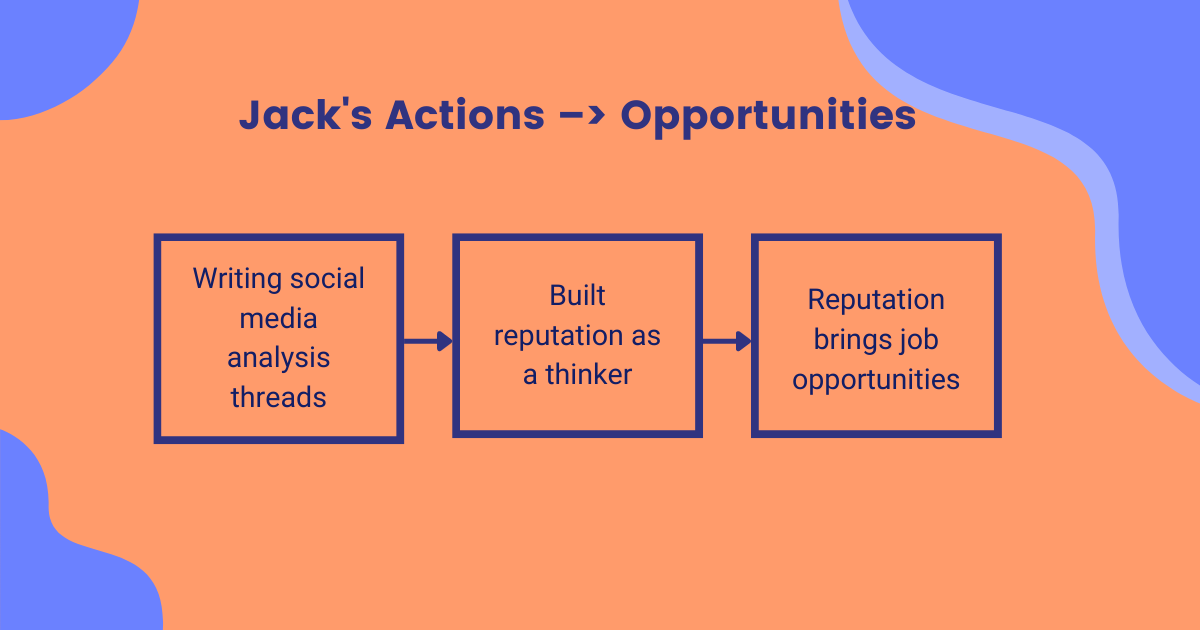
So I tweeted that, and true story, 12 minutes later, the woman who became my boss at Twitch messaged me and said, “Would you ever be interested in working here?” Three months later, I was wearing purple.
24 minutes after I tweeted that I’d been laid off, I received the cold DM that turned into my next job.
— Jack Appleby ☕️ (@jappleby) December 18, 2020
Sharing how you think on Twitter can lead to life changing moments. pic.twitter.com/UOKXiRHpSF
The same thing happened when I decided I wanted to leave Twitch for something new. That was my first time quitting a job without having the next job lined up - it’s a little scary! But I’d always wanted to try it, see what would happen if I openly put myself out there without having to sneak around interviewing.
It worked – I got calls from several of my dream companies and multiple final offers, almost all from conversations that started through Twitter. And eventually, I chose the one I wanted the whole time: to work for Morning Brew.
All of [my opportunities] came from proving my value and helping people way ahead of time. When I eventually had an area of need, people were inclined to help!
All of that came from proving my value and helping people way ahead of time so that those moments when I did have an area of need, which was a job, people were inclined to help and already felt comfortable knowing that I had expertise in the space!
Q: Your content seems to focus on transparency a lot – sharing the highlights and downturns of your career journey. Is that intentional?
I write most of my content about social media and advertising, but interestingly enough when I‘ve asked people how they found me, many reference my mental health content. For example, I wrote a thread about an opportunity I had to work with my favorite NBA player, which I completely ghosted.
Last summer, I had a shot at my dream job.
— Jack Appleby ☕️ (@jappleby) June 9, 2021
I ended up ghosting them. 🧵 :
It was my dream job, but I was spiraling through depression and struggling with the isolation of the pandemic, so much that I couldn't emotionally even get myself to write the email to do the thing. I had so much shame and confusion in that moment. A year later, I put it out there as a thread that not only went viral in the marketing community but made it all the way to Mark Cuban, the owner of the Dallas Mavericks. I’ve found that being vulnerable helps – I want to normalize discussion about the highs and lows of career-land.
Q: Because you’re a social strategist at heart, I hypothesized that you probably have a system and strategy for content ideas. How much of your personal branding has been a deliberate effort versus on-the-fly content?
A big part of personal branding: if you don't love what you’re building your brand around, it will fail. I’ve found great career success in building a personal brand around social media strategy because I love it! I’m genuinely curious about social media and communities, so it doesn’t feel like work to me. And I think there are real advantages to building a personal brand around your career. But if you're not fascinated by what you talk about, you’ll struggle - it takes a lot of effort.
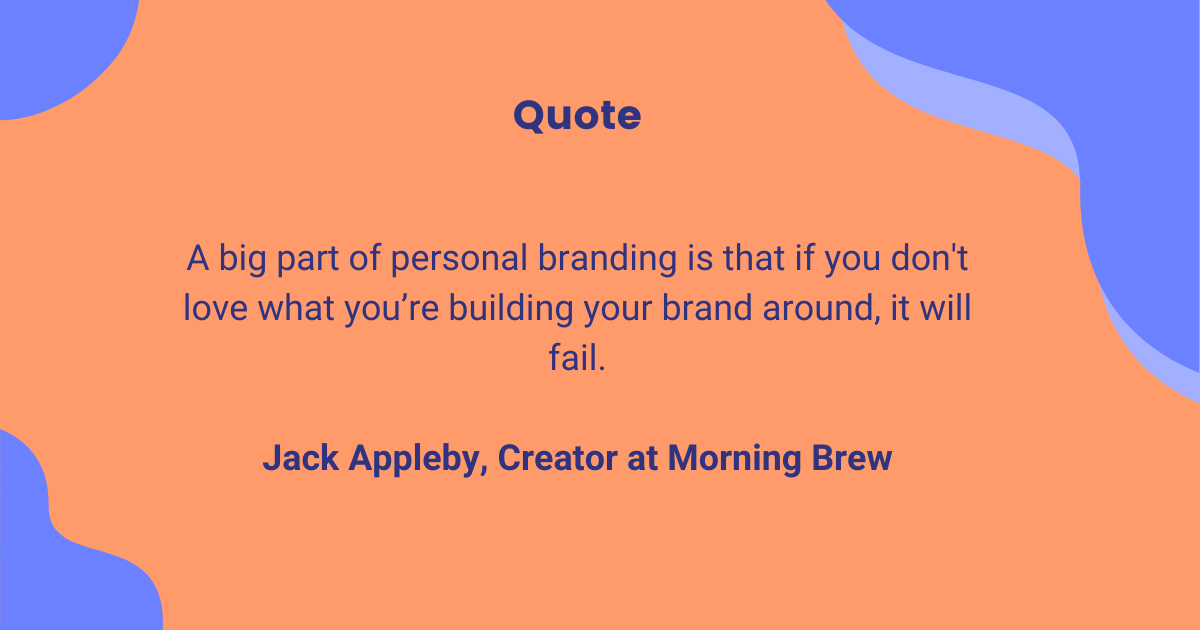
Most of my biggest personal brand successes came from making my analysis as accessible as possible. For instance, Xbox had a pretty big leak in 2020 where the image of their new console dropped before their official announcement. In 24 hours, they pivoted their entire social media strategy using memes, so I spent several hours writing out a timeline-based Twitter thread on their process.
A major, major @Xbox leak was handled masterfully on social in the middle of the night.
— Jack Appleby ☕️ (@jappleby) September 8, 2020
Let's look at how Xbox made several viral moments out of a bad day thanks to some memes, quick thinking, & a big company that's agile enough for fast approvals.
Thread 🧵 // pic.twitter.com/QBbeYs3pBJ
I knew that if I nailed it, the thread had a chance to go viral – and it did! But I love this stuff – it's just fun for me to write.
Q: I can corroborate that – having to constantly engage with a topic or industry you don’t care about can be exhausting. Given this, do you think everyone must have a personal brand?
As I’ve matured in my career, the language I use around personal branding has changed quite a bit. In my mid-20s, when I saw these huge opportunities coming my way thanks to my personal brand, I shouted to anyone who’d hear that they absolutely must build a personal brand! But as I’ve built my presence up, I’ve experienced plenty of the downsides, namely the toxicity of strangers. Now I’m more likely to say ‘there are amazing benefits to building a personal brand’ without that ‘you’ve got to do it’ language.
Q: What advice would you give someone trying to separate their personal brand identity from the company or industry they work with?
I think if you're looking to build a personal brand around your professional expertise, talking about your work will be an easy route to do that - it's going to be a cleaner way to share your experiences. Oddly enough, I did it the complete opposite way. A lot of my career was spent at agencies, and while I’ve worked for many big brands, there's always that little worry your clients might think you’re taking too much credit.
I built my accounts by analyzing other people's work because I wasn't sure how much I could talk about my own work! But now, at Morning Brew, I'm encouraged to talk about what I’m up to. If you're allowed to, that can be a huge brand-building technique.
Q: If you were starting over today as a person just building your personal brand, what advice would you give yourself?
Go engage with people. I’ve used Twitter as mostly a publishing platform, sharing my own thoughts. I almost think I made it hard on myself by focusing more on content than community. If I cut back on my production time and spent more hours just getting to know other people on Twitter, it’d have helped in shareability, connections, and support. I definitely recommend you go meet as many people as possible in your community of choice.
Q: What question do you wish I had asked but didn’t?
I think it’s important to highlight the downsides of building a personal brand. Candidly, the first time I went to therapy was because of something that happened on the internet. It wasn’t the only thing driving that decision, but it was the final straw.
The negativity is a major downside, so I have a zero-tolerance blocking policy right now – I currently have 767 accounts blocked and don’t apologize for a single one of them.
Q: What do you see as the future for personal brand building?
If you're building a personal brand based on a profession or your business expertise, there is immense value in having content that is deeper than a single social media post. Twitter is great, but 280 characters on their own only go so far.
Whether it's a newsletter, an encyclopedic YouTube video, a Twitter Note, or a deck that you've shared online, creating an in-depth piece of content – as opposed to high-level Twitter threads – is where you can go from someone who's in the space to someone who's provided value.
Think about this: how are you providing the biggest chunks of value at one time?
Social networks are where you're gonna grow your audience, for sure. But the thing you have to think through is: how are you providing the biggest chunks of value at one time?
Takeaways
Here are some of my favorite takeaways from chatting with Jack.
- Share what you love talking about anyway: If you’re very passionate about a topic, say the Marvel Cinematic Universe, then you probably love consuming content about it. And you also want others to hear all your thoughts on that topic. There aren’t many topics without a community of people that are passionate about them – and just as you are passionate about something, so are thousands of other people. And they want content. Jack’s passion is social strategy – what’s yours?
- Protect your mental health: Building an online presence might make you feel like you have to be online all the time, but that can easily lead to burnout and insecurity. Jack prioritizes his mental health and does not hesitate to take actions that protect it while online. Wherever you fall on the content creation spectrum – business owner, social media manager or creator, it’s important to set boundaries and take care of your mental health.
- Aim to provide value through your content: Jack poses an important question, “How are you providing value?” To grow an engaged audience, you need to go deeper than just posting a tweet or two once every other week. Prioritize experimenting with different formats to deliver your message, and find out how you can turn your expertise into content that connects with your audience.
💡Content creation isn't easy, whether as a job or a side project you’re using to grow your online presence. It takes time and consistency that not a lot of people can afford.
Automation can make it much easier for you to build that consistency – Buffer’s one of the tools that can help you with that.
Get started building your online presence with Buffer today!
Try Buffer for free
180,000+ creators, small businesses, and marketers use Buffer to grow their audiences every month.
Related Articles

TikTok just introduced Bulletin Boards, similar to Instagram's Broadcast Channels. Here's what you need to know.

We've reopened submissions for the new, cohort-based version of the Buffer Guest Post Program. Learn more in this article.

In this article, you'll find 20+ essential LinkedIn statistics that reveal the platform's reach, effectiveness, and continued growth.